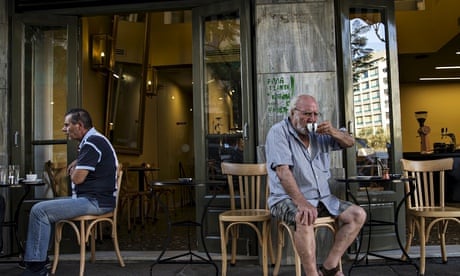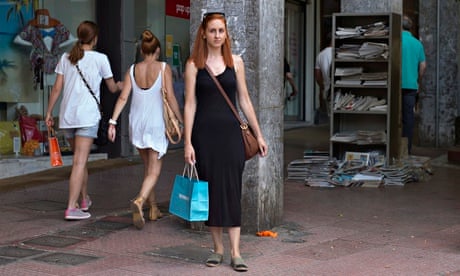John Hooper in Athens Sunday 5 July 2015
German finance minister, Wolfgang Schäuble, appears to bolster No vote in last-minute intervention on Saturday
A woman in Athens walks past referendum campaign posters reading “No” in Greek. Photograph: Jean-Paul Pelissier/Reuters

Investors around the world held their breath on Saturday as 10 million Greeks prepared to vote in a referendum that presents the biggest challenge to the euro since its adoption.
After more than five months of eyeball-to-eyeball confrontation between Alexis Tsipras’s radical left-led government and Greece’s creditors, and with only hours to go before voting began, one of the most hawkish of the lenders appeared to blink. Germany’s finance minister, Wolfgang Schäuble, until now even more of a hardliner than his chancellor Angela Merkel, suddenly turned a more conciliatory face towards Athens.
Having previously insisted that a No vote on the lenders’ last terms would see their country forced out of the euro, Schäuble told the Bild newspaper that the choice before them on Sunday was between holding on to the euro and being “temporarily without it”.
It was far from clear what Schäuble had in mind, but economists have mooted the notion of a period in which Greece might go back to its national currency, the drachma, while its economy recovered.
With pharmacists in Athens reporting that the government had rationed the distribution of drugs, and fears being raised of food shortages within weeks, the finance minister of Europe’s biggest economy said: “It is clear that we will not leave the [Greek] people in the lurch.”
What effect Schäuble’s last-minute intervention may have on the vote is impossible to gauge. But it appears to favour the No camp.
His remarks seemed to endorse the claims of the Greek government, which has called for a No vote, to the effect that a majority in favour of rejection would not lead to the country’s exit from the euro (“Grexit”).
The German minister’s tone was strikingly at odds with that of his charismatic but controversial Greek counterpart, Yanis Varoufakis, who turned up the heat before the ballot by accusing Greece’s creditors of terrorism.
“Why did they force us to close the banks?” he asked in an interview published by the Spanish daily El Mundo. “To instil fear in people. And spreading fear is called terrorism.”
Rallies in support of Greece were held in several European capitals on Saturday. Others were also held in Britain: in London, Liverpool and Edinburgh.
Greece’s lenders were not the only people spreading alarm. Several economists warned that financial markets were underestimating the risks of a No vote – and even of a Yes vote.

The streets are calm but Greece is haunted by fear of civil strife
The referendum debate has entered every family and every home – and there is a growing alarm that, no matter what the result, the divisions will not heal
The situation is Greece has become increasingly fragile against a background of growing problems in China. In an effort to stabilise China’s stock markets, which have slumped by almost 30% since the middle of last month, its top securities brokerages said on Saturday that they would buy at least 120bn yuan (£12.4bn) of shares.
The undertaking followed a string of official policy initiatives in the last week that included a cut in interest rates and a relaxation of margin lending rules. None has so far succeeded in halting the slide.
The Oxford Economics think-tank warned that the closure of Greece’s banks and the imposition of capital controls last weekend would be difficult to reverse.
“Cyprus was able to gradually loosen capital controls because of a decisive and credible commitment to reform. This is not possible in Greece,” it said. “Our latest scenario analysis suggests an exit probability of around 67%.”
In a reference to the 2008 collapse of Lehman Brothers – the spark that detonated global recession – Megan Greene, chief economist of the Canadian asset management firm Manulife, said: “Grexit would be a Lehman-type event, but with a much slower fuse.”
She added: “The immediate impact might be relatively muted in the markets. But the next time there is a cyclical downturn in Europe, bigger countries like Spain and especially Italy may decide they’d like to benefit from a devaluation to return to growth and leave the Eurozone themselves. This would ring the death knell for the common currency.”
Polls on Friday showed no clear difference between the two sides. But they did show an overwhelming majority of Greeks – around three-quarters – want their country to keep the euro.
Among the many imponderables before the vote is the impact of votes cast by Greeks living abroad. Under the same rules that govern elections, expatriates must return to the country if they are to cast valid ballots.
There was evidence that large numbers of Greeks living abroad were coming back for the referendum and that they formed a bloc made up largely of Yes voters.
Rallies have highlighted a big social divide between the two camps, with the more affluent favouring acceptance of the terms and those who have little or nothing to lose more inclined to vote No.
Almost 9.9 million Greeks have the right to vote in the referendum, which the interior ministry said would cost less than €25m – less than half the amount spent on the general election in January that brought Syriza into office in a coalition with the populist, nationalist Anel party.
Polling stations will be open from 7am local time until 7pm (5pm British summer time). The first results are expected around 9pm.

In an Athens market, the talk is of paying bills, pensions, job cuts … and a better life
Yes or No? Ordinary Greeks share their hopes and fears on the eve of the referendum that will change their lives
A No vote is also supported by the neo-Nazi Golden Dawn party. The centre-right opposition New Democracy party has pressed for a Yes vote as have Pasok and To Potami, both of the centre-left.
The head of Greece’s Bank Association denied as “completely baseless” a report in the Financial Times that Greek banks were preparing contingency plans for a possible “haircut” on deposits.
Citing people with knowledge of the measures, the FT said the plans called for a 30% raid on balances of more than €8,000.
But the seriousness of the financial situation was underlined on Friday when in her capacity as chair of the country’s biggest retail bank, the National Bank of Greece, the same banker said that without a fresh injection of funds from the European Central Bank, ATMs would run out of cash within hours of the vote.
Greek referendum: Germany says it won’t leave Greece in the lurch | World news | The Guardian
![The [Greek] European Tragedy](https://blogger.googleusercontent.com/img/b/R29vZ2xl/AVvXsEiWKI5s90SFm1wWTk6bs4p7CgslaC2SnYPsrZhb-B-smOufNNCSxCvpBLI9hOB-LsXZjir_PNmEiMk2-E62F3xkg96IoC6QFAaZAnPRTVH340IN9WBRmWJqPkjWlgyRj3zpALp7h6hvA58/s920/GkBack_new.jpg)